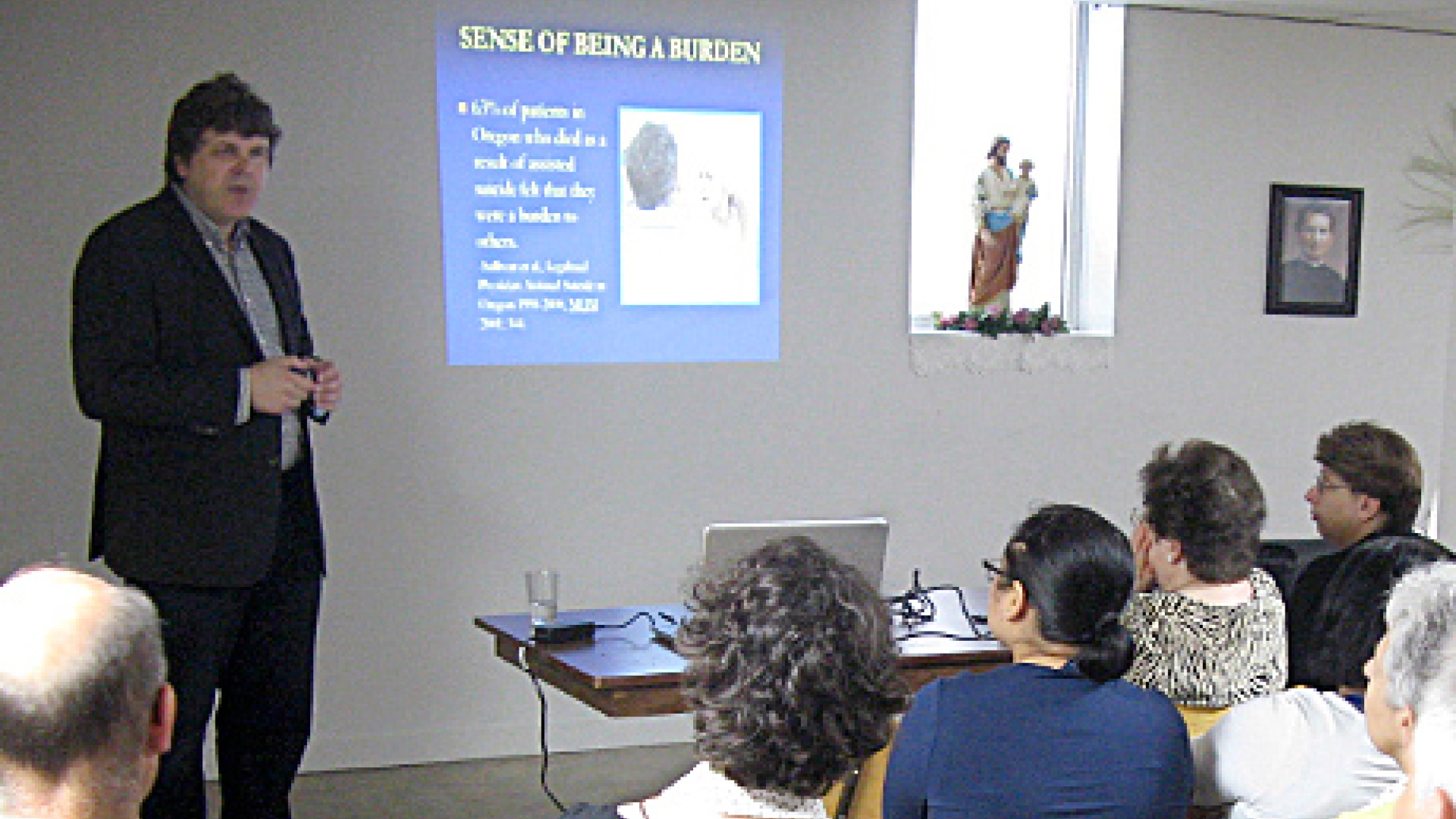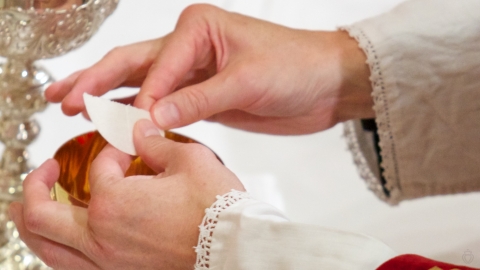Pro-life talk by Dr. Rados

The Men’s Group from Our Lady of the Rosary Parish in Winnipeg, under the priestly care of the Society of St. Pius X, invited the distinguished and eminent physician Dr. Larry Rados to give his presentation on Sunday July 5th against Euthanasia.
Dr. Rados is an emergency physician working in Winnipeg at Misericordia Urgent Care. He is also a lecturer in the department of Family Medicine at the University of Manitoba. Over the past several years, Dr. Rados has given numerous presentations on various pro-life topics throughout Manitoba. He has served as the vice-president of Manitoba Physicians for Life. In 2007 he was presented with the Joe Borowski award by the Winnipeg League for Life for his efforts in promoting a culture of life.
Dr. Rados who is a practicing Catholic, gave a most interesting, informative and inspiring talk with some quips of humour to lighten this grave, but timely subject.
Dr. Rados began his discourse by showing the congregation at Our Lady of the Rosary how he, personally as a physician, and all physicians are bound by the Hippocratic Oath to preserve life and not take it: “I will give no deadly medicine to any one if asked, nor suggest any such counsel”.
Dr Rados saw the abandonment by people of the redemptive power of the Cross (to “offer it up”), the lack of willingness to express compassion (suffering with the other) and the lack of empathy to offer real caring support (visiting, talking to patients, looking after those suffering), lack of supportive networks (family, fiends, volunteers) as some of the main reasons why so many want to die; they feel unsupported, uncared for, unloved, abandoned and neglected. He also pointed at how crucial palliative care is to manage pain. Nowadays palliative care can manage most types of pain.
Dr. Rados went on to demonstrate to his audience how those countries which have since legalized assisted suicide and euthanasia have steadily increasing death rates due to assisted suicide and euthanasia. Holland was one the first countries to adopt legalization of euthanasia, and in the cases reported, informing or even obtaining patient consent was not even done!
Dr. Rados asked how is it, that the euthanasia which at one time was viewed as a war crime is now seen today as an acceptable, dignified, and humane practice. The answer, which is not new or surprising to traditional Catholics, is the steady decline of the faith, especially that of the Catholic faith. It is the same reason why there are so many evils prevalent today in society. And statistics sadly prove that in those countries where euthanasia was allowed, the majority of the population neither professed any faith in God nor attended church services.
Then Dr. Rados went on to show his audience, and to make them judge for themselves, just how poorly those nations are doing in many areas after the legalization of euthanasia. Dr. Rados also pointed out that euthanasia is not only performed on the elderly and on those with terminal illnesses, but infants and children with physical disabilities are also its prime targets. Research also shows that an important percentage of individuals put to death were misdiagnosed and had not been terminally ill in the first instance, or were suffering from depression and felt lonely, or the illness could have been dealt with using palliative care.
Dr. Rados also brought to light an interesting example in the famous and recent case of Brittany Maynard who made the cover of People magazine. Euthanasia supporters have made her their poster girl and hero, but Dr. Rados believes that she should not be the champion that society should herald. Known to God, but unknown to the public, an elderly man diagnosed with the same type of brain tumor as Brittany had regards his glioblastoma multiform as the greatest blessing of his life. Since being diagnosed with this 13 years ago, he has used his illness to help others deal with theirs. Dr. Rados pointed out as a side note that the brain tumor Brittany had, and when found in women, is the result of using the birth control pill.
What could make someone desire or even consent mentally to the thought of euthanasia is another thought provoking question that Dr. Rados posed to his listeners. For the answer, he related the following true story: a man was sent to the hospital with a non-terminal illness and eventually his visitors stopped coming to visit him. Then he stopped getting phone calls. Next his wife stopped coming to see him and lastly, even she stopped calling him. He started to consider the possibility of euthanasia, but next to the hospital was a Christian school where the students were asked to visit the sick. He started to be visited again and regained his hope and eventually he recovered his former desire to live.
This story shows the importance of the very much needed, but often easily neglected and overlooked corporal work of mercy to visit the sick. Again, this was a practice more frequently done in days gone by and Frank Duff even made it one of the chief duties that could be assigned in the Legion of Mary!
Lastly, Dr. Rados reminded his audience that often Catholics who have the truth, act very little upon it, they either look away or put their heads in the sand.
As early as February of next year, the Supreme Court of Canada is looking to make euthanasia legal in Canada, and what are Catholic Canadians going to do about it?
Dr. Rados asked his listeners to leave remembering this one quote from a bishop: “Was there nothing worth fighting for?”
As Catholics, we must stand with and for those who suffer, and offer them companionship and show them our caring disposition. We must show zeal in our Faith and principles to protect and defend human life from conception to natural death, and be prepared to speak up and stand up for the intrinsic dignity of the person and to protect human life at home, school, hospital, work and in the political arena. The intrinsic value and personal dignity of every human being does not change depending on their circumstances.
Two pertinent quotes can guide faithful Catholics:
Bear ye one another's burdens; and so you shall fulfil the law of Christ” (Galatians 6:2)
For as the Apostle with good reason admonishes us: "Those that seem the more feeble members of the Body are more necessary; and those that we think the less honorable members of the Body, we surround with more abundant honour." Conscious of the obligations of Our high office We deem it necessary to reiterate this grave statement today, when to Our profound grief We see at times the deformed, the insane, and those suffering from hereditary disease deprived of their lives, as though they were a useless burden to Society; and this procedure is hailed by some as a manifestation of human progress, and as something that is entirely in accordance with the common good. Yet who that is possessed of sound judgment does not recognize that this not only violates the natural and the divine law written in the heart of every man, but that it outrages the noblest instincts of humanity? The blood of these unfortunate victims who are all the dearer to our Redeemer because they are deserving of greater pity, "cries to God from the earth.”
(Pope Pius XII, Mystici Corporis Christi)



